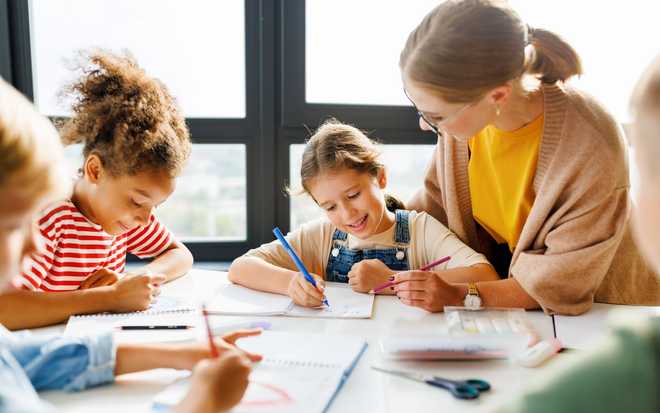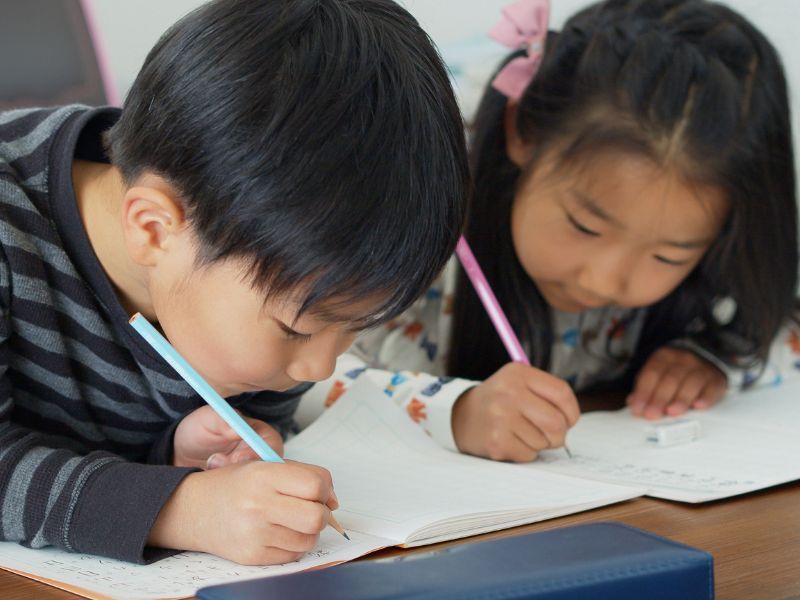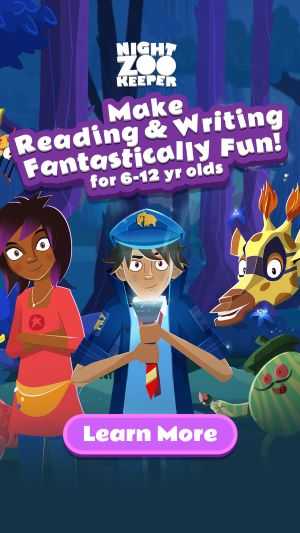Grade 2 Language Arts
Discover what your child will learn in Grade 2 language arts

Home > Language Arts > Grade 2
In second grade, children improve their language arts skills mainly by using them in critical thinking activities. From exploring different points of view in stories, to mastering the use of contractions and possessives, second graders will sharpen their communication skills and gain confidence in expressing their thoughts.

Reading
In Grade 2, children start to broaden their vocabulary through exposure to a variety of writing styles, and direct instruction of:
- single-syllable words with long and short vowels
- two-syllable words
- prefixes and suffixes
- synonyms and antonyms
- verb tenses
They also start to read a range of text types including short stories, informational texts, and poetry, gaining familiar with the nuances of different writing styles. Children are then expected to answer (verbally, and in writing) comprehension questions on these texts that begin with "how", "when", "where", "why", and "who".
Reading fluency is also a focus in second grade. As their sight word knowledge grows, children will begin reading more smoothly, enabling them to pace appropriately, and add intonation and emotion during read-aloud activities.
Spelling
In Grade 2, spelling instruction focuses on reinforcing phonics knowledge, learning new spelling patterns and discovering alternative spellings for sounds. Children continue to work with prefixes ("re-", "un-") and suffixes ("-ed," "-ing," and "-less"), and begin applying rules for modifying root words before adding suffixes, such as dropping an end "e" when adding "-ing". They also practice consonant blends, are introduced to the consonant l-e syllable type, and work with r-controlled vowels. Second graders are also encouraged to use dictionaries to check and correct their spellings, as well as to learn abbreviations and compound words, developing independent spelling.
Grammar
In second grade, children start using a variety of nouns, including irregular plural nouns like 'feet' and collective nouns like 'choir.' Reflexive pronouns such as 'himself' and 'themselves' are introduced to avoid repetition in sentences. Homophones are taught to distinguish between words that sound the same but have different meanings, such as 'to,' 'too,' and 'two.' Children also focus on mastering subject-verb agreement and the proper use of different parts of speech, and learn more about pronouns.
Second graders continue to develop their understanding of verbs, learning both regular and irregular past tense forms. While regular verbs follow the -ed pattern, irregular verbs like 'went' and 'made' must be memorized. Adverbs are introduced, and distinguished from adjectives
By mastering these concepts, second graders can create more grammatically sophisticated sentences, richening their expression.
Punctuation
Grade 2 students should build upon their understanding of basic punctuation, applying it more consistently in their writing. They are expected to use periods, question marks, exclamation points, and correct capitalization to ensure their sentences are properly structured. They will continue learning about commas, especially in the context of letter writing, where commas are used in dates, greetings, and closings.
Another development in second grade is the introduction of apostrophes. Children learn how apostrophes are used to indicate possession (e.g. "Bertie's umbrella"), and in contractions, such as shortening 'does not' to 'doesn’t'.
Writing
In Grade 2, children will continue to work on opinion, informative, and narrative writing.
In opinion writing, they’ll learn how to state their opinions, support them with reasons, and conclude their arguments effectively. They will be expected to demonstrate logical reasoning, using context clues to strengthen their arguments, and incorporating appropriate conjunctions like 'because' and 'also.'
For informative writing, children will need to gather and organize information on a topic to write clear and structured articles, often requiring the inclusion of titles, sub-headings, and diagrams, while ensuring their work is composed of complete sentences.
In narrative writing, children will be tasked with crafting stories with clear beginnings, problems, and solutions, while adding descriptive details about characters, settings, and emotions. They’ll also begin to make inferences about character motives and plot developments to enrich their stories.
How Night Zookeeper can help

Night Zookeeper is an award-winning language arts program designed to make reading and writing fantastically fun for kids! It features interactive games, skill challenges, creative writing prompts and engaging lesson series to build all your child's language arts skills. Our qualified tutors also give your child constructive, personalized feedback on their writing.
Sign up today and enjoy a free 7-day trial—no commitment required!
Related articles


Make Reading & Writing Fantastically Fun!
- Award-winning reading & writing program for kids
- Improves spelling, grammar, punctuation & vocabulary
- Over 1,000 different learning games and activities



